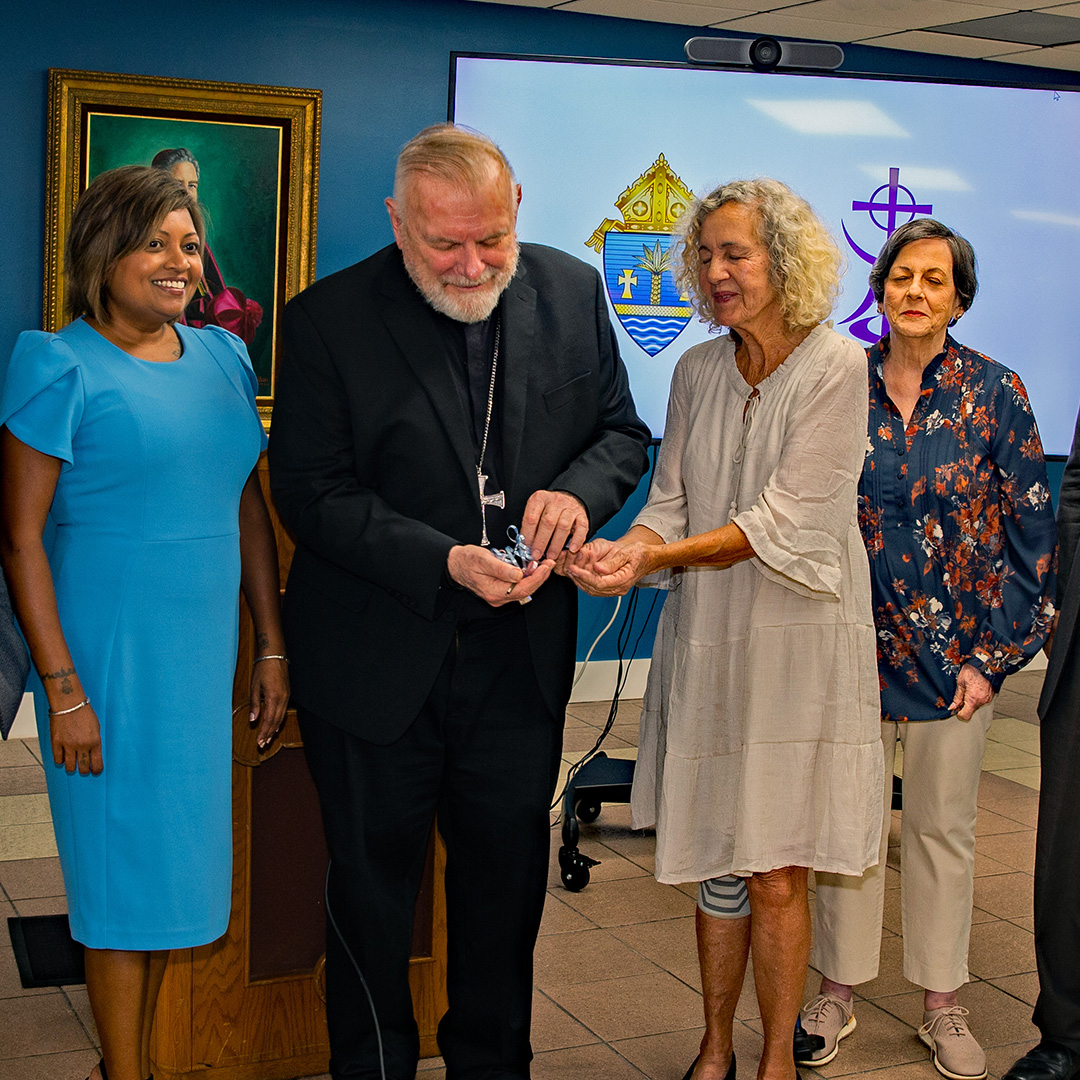By Marlene Quaroni - Florida Catholic
MIAMI | Alumnae of Ursuline schools in Havana, Cuba, have officially turned over ownership of their alumni residence building in Little Havana to the Archdiocese of Miami. The residence will serve as a shelter for needy pregnant and postpartum women and their babies.
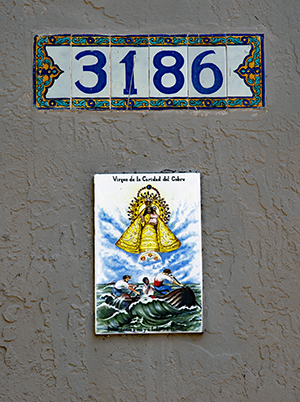
Photographer: MARLENE QUARONI | FC
The Ursuline Residence, a five-unit apartment building owned by the Ursuline Alumnae, was donated to Catholic Charities of the Archdiocese of Miami to house needy pregnant and postpartum women and their babies.
“The archdiocese opened its doors to Cubans in the 1960s,” said Margarita Aguiar, president of the Ursuline Alumnae Association, as she handed keys to Archbishop Thomas Wenski during a ceremony at the Pastoral Center, Sept. 3, 2024. “We appreciate what you have done for us.”
The Ursuline religious, a community which originated in Italy in 1535, operate schools throughout the world. They were the first teaching order of women, dedicated exclusively to the education of young girls. They opened their first schools in Cuba in 1807. The Castro regime shut down the two Havana schools in 1961. The schools included an elementary and college preparatory school in the Miramar neighborhood, and an English-speaking elementary and vocational high school in the Biltmore neighborhood named Merici Academy, after the foundress of the congregation, St. Angela Merici.
The Ursuline alumnae, formally known as Antiguas Alumnas Ursulinas Association, bought land at 3186 West Flagler Street in 1981 and constructed a residence in 1991. The association welcomed graduates of the schools and their relatives to live at the Little Havana home for a modest rent.
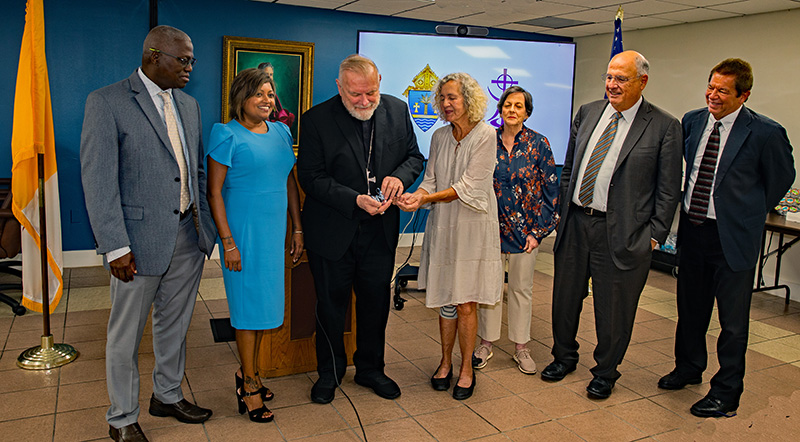
Margarita Aguiar, president of the Ursuline Alumnae Association, center, presents Archbishop Thomas Wenski with the keys to the Ursuline Residence during a ceremony at the Pastoral Center Sept. 3, 2024. Participating in the ceremony were, from left, Jules Jones, chief financial officer of Catholic Charities; Devika Austin, chief administrative officer of Catholic Charities; Amada Alvarino, past president of the Ursuline Alumnae Association, counselor; Rafael Penalver, attorney for the Ursulines; and Peter Routsis-Arroyo, CEO of Catholic Charities.
Amada Alvariño, the association’s advisor and former president, attended the ceremony along with attorney Rafael Peñalver, who negotiated the exchange.
Aguiar pointed out that after more than 40 years of existence of the Ursuline Alumnae Association and with the donations during all these years of its more than 200 members, they have been able to maintain the Ursuline Residence until now, when they decided to donate it to the Archdiocese of Miami to help pregnant women and children.
Both Aguiar and Alvariño thanked the valuable work of their members, such as Eva Vigil de Menendez, Gloria Prieto, Mirta Luis de Marcos, Irma Berrayarza, Marta Manzanilla, Mirta Whitmarsh, Carmen Lorenzo y and many others who have maintained this residence until today.
During the ceremony, the archbishop thanked the Ursuline alumnae for their generous gift.
“This will offer a place of refuge and support to a vulnerable community,” he said. “Some have said that those who are pro-life don’t care about mothers and their babies after the baby is born. This endeavor shows a lie to that accusation. We care about life from conception to natural death.”
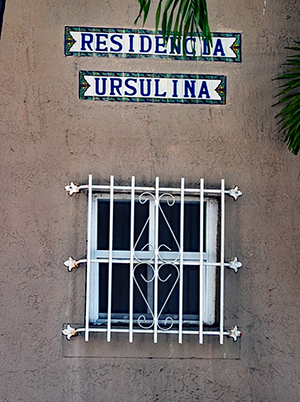
Photographer: MARLENE QUARONI | FC
The Ursuline Residence, a five-unit apartment building owned by the Ursuline Alumnae, was donated to Catholic Charities of the Archdiocese of Miami to house needy pregnant and postpartum women and their babies.
The building is in the process of a 40-year recertification process, said Peter Routsis-Arroyo, CEO of the archdiocese’s Catholic Charities, the organization that will run the facility.
“Catholic Charities will make renovations estimated at about $100,000,” he said.
The building has five apartments and a conference room. “Women and their babies can stay at the shelter for up to a year.”
The new transitional housing program will be a safe haven that will provide a caring and supportive environment for mothers and their infants.
In the future, Catholic Charities hopes to expand the program to offer a comprehensive suite of services including access to pre- and postpartum care, intensive case management, counseling, vocational training, education, parenting classes, nutritional support, and childcare, designed to help the mothers move toward self-sufficiency.
Donations can be made online at www.ccadm.org or mailed to Catholic Charities of the Archdiocese of Miami, Inc., 1505 N.E. 26 Street, Wilton Manors, FL 33305. For further information, email Catholic Charities at [email protected] or call 954-315-2612.
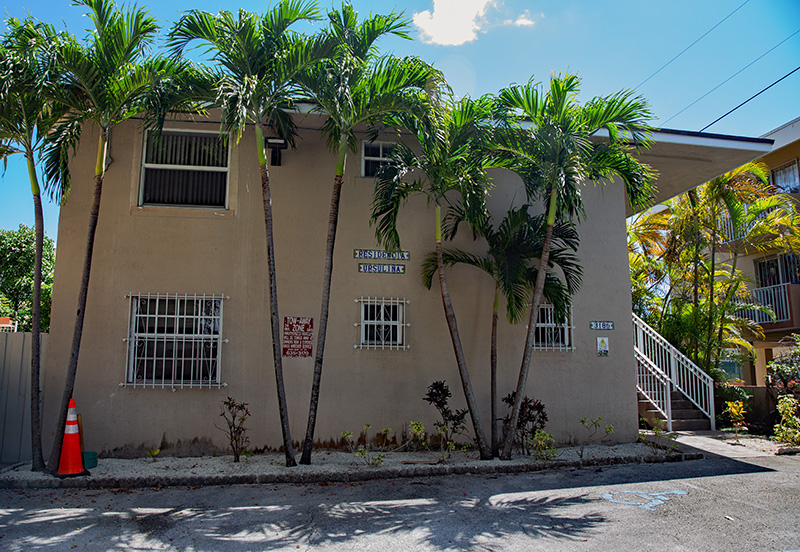
Photographer: MARLENE QUARONI | FC
The Ursuline Residence, a five-unit apartment building owned by the Ursuline Alumnae, was donated to Catholic Charities of the Archdiocese of Miami to house needy pregnant and postpartum women and their babies.
